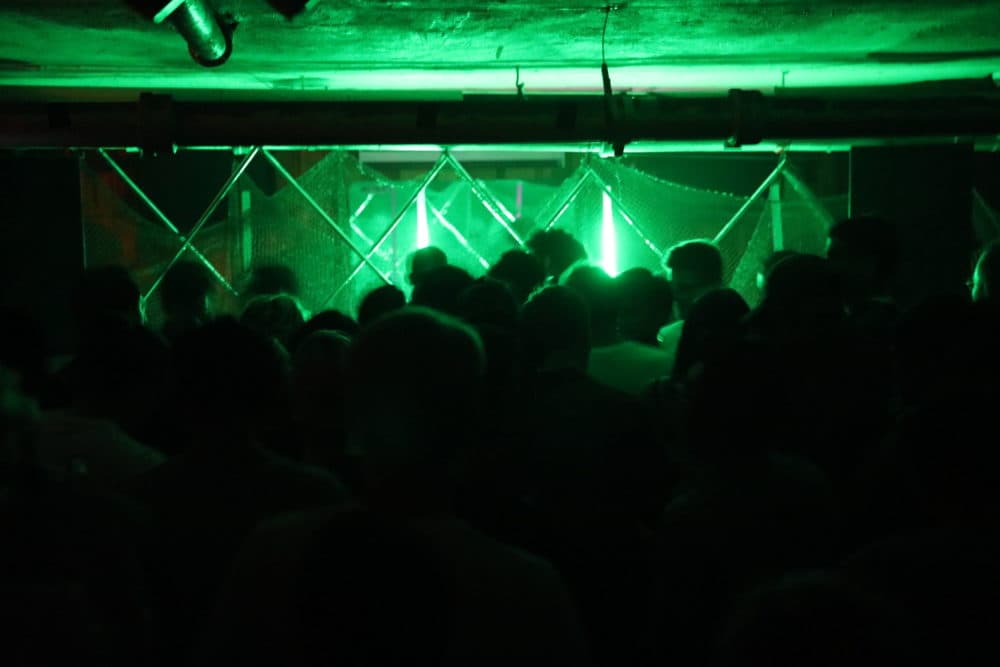Advertisement
A Cambridge DJ Celebrates Pride And Black Lives Through Techno Music

Pride celebrations the world over are finding renewed fire — returning to the movement’s activist roots and supporting Black Lives Matter. Manu Miran, founder of Cambridge-based dance gathering Visceral, is using his platform to uplift this collaborative revolution.
Miran is hosting a three-hour DJed set — accompanied by Visceral resident DJ Gabriel Pelaez — at 1 p.m. on Saturday, June 27, as part of Parir La Bestia, or “birth of the beast,” online Pride celebration by Latinx techno collectives. The beats pumped out during this fundraising performance will synch with the heartbeat of Visceral’s mission of inclusivity.
Prior to the COVID-19 pandemic, you could find the Venezuelan-born curator and DJ partnering with other artists and spinning sets of conceptual electronic music at Cambridge’s The Lower Level, Brooklyn and elsewhere. His sets soar through genres, with sitars and quarter-tone chanted tunes flowing into raw percussion and sensual synths. Visuals created by artists are often generated in real-time and splash the walls with euphoric colors.
“Given the history of racism in this country, and constantly being a subject of racism and discrimination myself, running the largest techno platform in Boston is a political act."
Manu Miran
Before he founded the platform in 2016, Miran noticed a glaring discord. For techno’s multitude of sounds, the talent was mostly one-note, with people of color and LGBTQ+ artists often tokenized on event lineups to meet a diversity quota. “The monopolization of the electronic music scene in Boston — favoring mostly white and straight artists — and the homogeneous and homophobic dancefloor experience also felt inaccurate and outdated with what I was experiencing back then in the underground nightlife elsewhere in Brooklyn, Berlin and Chicago, to name a few,” Miran says.
With Visceral, he has always aimed to promote diversity and cultural inclusivity from within and inspire those on the fringes to add their voices to the chorus. “Given the history of racism in this country, and constantly being a subject of racism and discrimination myself, running the largest techno platform in Boston is a political act,” he adds.
He grew up in Venezuela and speaks of trips to Margarita Island where he’d spend hours dancing to the drums with the locals at Playa El Yaque at sunset. “I grew up as a contemporary dancer, and as a deaf person, I’ve always had a bodily relationship with dance music,” he says. He attended law school at Suffolk University and left Venezuela for good in 2011, shortly after graduation. “I knew that I was not going to fit in a machista” — an exaggeratedly masculine — “and largely homophobic society and the political situation there was worsening,” he says. According to the United Nations Refugee Agency, over 4 million Venezuelans have fled the nation in recent years in the face of political unrest.

The current climate in America strikes a familiar chord for Miran. The protests against police brutality that are roiling across the country in the wake of the killings of George Floyd and Breonna Taylor by police. The recent murders of Black trans individuals Dominique "Rem'mie" Fells, Riah Milton and Tony McDade — and the many other victims of systemic racism that has plagued America since its founding.
“It’s time that white and non-Black people start thinking from an anti-racism perspective,” Miran says, “meaning to be proactive in contributing to reparative actions that help dismantle political and socioeconomic infrastructures that were built specifically to both segregate and benefit people according to the color of their skin.”
So when Mexico City-based techno collective Por Detroit invited Visceral to join the other Latinx groups for the Parir La Bestia virtual Pride, Miran knew he wanted Visceral’s broadcast to give back. “The entire electronic music scene owes a great deal to the Black community, and especially to the trans community, who have been the true cultural founders and innovators of electronic music as it’s known today,” he says.
"The entire electronic music scene owes a great deal to the Black community, and especially to the trans community, who have been the true cultural founders and innovators of electronic music as it’s known today."
Manu Miran
The profits from his and Pelaez’s set will benefit the Black Trans Advocacy Coalition Mission and Cuatro Por Venezuela, a nonprofit that provides humanitarian services in Venezuela. Attendees can get tickets for $3 per day to join the event’s Zoom dance party, or those facing tough economic times can still enjoy a free stream of the lineup on Twitch. Tips are also welcomed via PayPal.
Visceral’s set for Parir La Bestia — a multimedia performative installation entitled “Visceral / Pandemonium” — is inspired by Fiona Apple’s latest album “Fetch the Bolt Cutters” and explores liberation through sound and projected visuals. “The concept is also inspired by COVID-19 and racism as interconnected pandemics, the anti-racist sociopolitical movement that’s been growing in the past few months, and the way this movement parallels my experience as a political activist in Venezuela during law school, where protests and extreme police and military violence have been rampant in the last two decades,” he says.

As for Pride here in Boston, he weighs in on the backlash against Boston Pride’s response to antiracist demonstrations — which did not include input from the organization’s own Black and Latinx committees. “Boston Pride is an organization that has ignored POC communities and their calls for better support, representation and visibility within the board,” he says. Like nearly 3,000 people who signed a petition so far, Miran calls for the board to resign, noting that they’ve “lost all credibility they may once have had.”
Just like Visceral’s performances embrace a range of art forms, Miran’s activism carves a wide, inclusive, path. “Queer oppression goes deeper than homophobia and misogyny, and these issues cannot be discussed without including transphobia and racism.”
